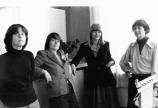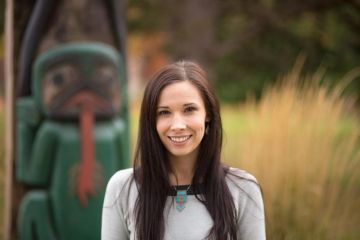Women pave way for women’s studies

From The Ring, March 23, 1979, p.2
Women in Victoria will soon be able to study contributions in Canada made by others of their sex, thanks in part to the efforts of four women on campus. As members of the women’s studies committee, they are hoping that enough women from the campus and community will register in UVic’s first women’s studies course to make it a success. Men are also welcome.
The interdisciplinary course, to begin this fall, is entitled “Women in Canada”. It will be offered on both a credit and non-credit basis and be open to people from all walks of life and educational backgrounds, explains Dr. Jennie Waelti-Walters (French), current chairperson of the committee.
Other committee members are Dr. Paddy Tsurumi (History) last year’s chairperson, Dr. Connie Rooke (English) upcoming chairperson and Theresa Iverson (Library). Student representation will be added after registration.
“It’s very important to us that the course succeed. We’ve been working on it for three years,” says Waelti-Walters.
The course made it into the 1978-79 Calendar but didn’t get into the classroom due to organizational delays. This year it is definitely off the ground.
Waelti-Walters says President Dr. Howard Petch has been a strong supporter of the course and this year approved special funding for it to begin in the fall. The committee would like to draw 80 or more students this year to elevate the course from its current trial status to a more permanent place in the curriculum.
Because of the interdisciplinary nature of the course, it does not come under the umbrella of one department. Initially the committee reported directly to the president through the president’s advisory committee on equal rights and opportunity. They now report to the Dean of Arts and Science.
“Women in Canada” will be offered through a lecture series and four seminar courses. The lectures will discuss a broad variety of topics of interest to women, and provide background material for the four seminars which will focus on women and Canadian art, literature, philosophy and sociology. The emphasis in the lecture series will be on social issues in the fall term and cultural issues in the spring.
Three of the four or five instructors will be teaching under part-time sessional lecture appointments, Faculty members Rooke and Waelti-Walters will lead the literature seminar. Other instructors will be Dr. Josephine Payne, a philosopher who has taught women’s studies courses in the United States, and anthropologist Dr. Jeanne Cannizzo who has worked and done research in women’s studies and taught previously at UVic. The appointment of sociologist Jeanette Auger will depend upon enrolment. Tsurumi will be on study leave next year.
Guest lecturers include Dr. Angus McLaren (History) who will discuss birth control, Dr. Phyllis Senese (History), Dr. Gwladys Downes who recently retired from the French department, Linda Hardy (Theatre), Victoria lawyer Gillian Smith and local artists, writers and musicians.
The women’s studies committee is optimistic about what they think will be an exciting course.
“The course will have an academic rather than a consciousness raising focus. It is intended to give women a sense of self-esteem coming from the discipline itself and the sense of a job well done, to give them a sense of their own worth and the assurance that they are worth studying,” says Waelti-Walters.
“The mechanics of the course are a bit complicated because we don’t know where our audience is coming from,” she adds.
The fall and spring terms will each be given for 1.5 credits. Students will be able to register for either one term or both. An hour each week will be devoted to a lecture to be attended by all students, and those taking the course for credit will attend the weekly two-hour seminars. Times will be arranged to accommodate students taking the course for credit who can only attend in the evening. Students taking the course for 3 credits will register in one seminar topic in the fall term and another seminar topic for the spring.
Women’s Studies 200A and 200B’s non-credit division is open to everybody interested, regardless of their educational background. Those taking the course for credit must have the normal university prerequisites for a second year course.
UVic has been “a bit slow of the mark” in offering women’s studies courses, says Waelti-Walters. “I think they’ve been started in most major universities across the country.”
Students can take a minor in women’s studies at Simon Fraser University where women’s studies is “thriving quite well I think. There are also a couple of courses at UBC but it is not a formally constituted program there.”
Waelti-Walters has no doubts about the importance of offering women’s studies.
“I teach French which as a predominance of women students and yet, even in class ratios of 18 women to two men, in most years just about all of the girls will wait for the men to speak first. They have been trained to wait for the men to go first. In women’s studies, we have to show them that their own feet are worth standing on.”
aelti-Walters points to the numbers of tenured women faculty members at UVic as another sign of a need for more programs to offer women encouragement and support.
“Two or three years ago only about 40 out 600 tenured professors were women. I doubt that we’re now up to one in 10. And there are only two or three women who are full professors on campus.
The women’s studies committee hopes that the new course will draw its enrolment from both the student body and staff on campus, as well as from downtown.
Broad faculty involvement is also welcome as the committee wants to revolve the instructional staff and choose different themes for the course each year.
The committee is beginning to advertise both on and off campus to reach potential registrants. They are “very Pleased” with a logo designed for their course by Victoria artist Gail Chin Bryant. …
It is not the committee’s aim to grow and develop into a department of women’s studies, according to Waelti-Walters. Most courses taught at university now could be described as men’s studies, she says, in that they deal principally with the ideas and actions of men.
“We hope that eventually all departments will take proper responsibility for the study of women in their own discipline. If this were to happen, separate women’s studies courses wouldn’t be necessary.”
Photos
In this story
Keywords: women's studies, interdisciplinary, gender



